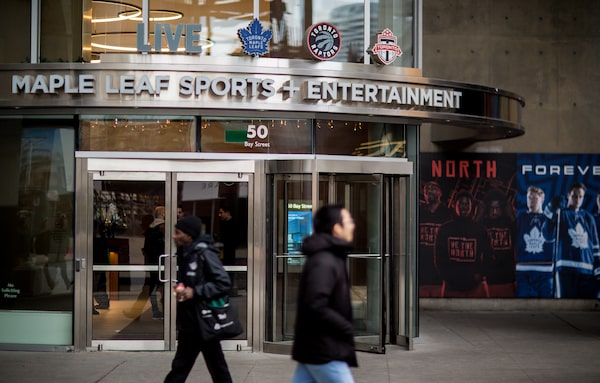
The Maple Leafs Sports & Entertainment offices at Scotiabank Arena in Toronto on Dec. 7, 2018.Melissa Tait/The Globe and Mail
Maple Leaf Sports & Entertainment has a governance problem.
Its secret board shake-up is a sign the protracted Rogers family feud is creating oversight risks for the parent company of hockey’s Toronto Maple Leafs and basketball’s Toronto Raptors, especially in light of new details unveiled in a court filing on Thursday.
Melinda Rogers-Hixon’s departure as a MLSE director – and the appointment of her replacement, David Miller, a loyalist of her brother Edward Rogers – should have never been kept hush-hush. The change wasn’t publicly announced via a press release; her name was simply scrubbed from the section of MLSE’s website that lists its directors.
Sure, it’s a perfectly legal move for a private company to make. But MLSE isn’t any old private company. Its ownership of this country’s premier sports franchises, which also includes soccer’s Toronto FC and football’s Toronto Argonauts, means it has an outsized cultural impact on Canadians.
MLSE is co-owned by Rogers Communications Inc. RCI-B-T, BCE Inc. BCE-T and MLSE chairman Larry Tanenbaum’s Kilmer Sports. But Ms. Rogers-Hixon’s quiet departure from its board – which a new court filing suggests came at the behest of Rogers CEO Tony Staffieri – is creating the impression that Rogers’s own disclosure and governance practices are rubbing off on MLSE with the blessing of its other owners.
Rogers wasn’t exactly forthcoming with the public about its latest boardroom shuffle either. Although two independent directors, Jack Cockwell and Jake Kerr, left its board in recent months, Rogers never bothered to issue a press release about their departures. Instead, the company just removed their names from its website and filed an updated notice of articles through the SEDAR filing system.
MLSE’s secret board shake-up is a governance failure
Considering that Mr. Cockwell and Mr. Kerr were initially backed by Mr. Rogers, the board’s chair, and installed by a written resolution less than two years ago – and in the middle of a corporate power struggle, no less – it was a moral failing on the company’s part to bury the information in a securities filing.
That tactic may have satisfied securities regulators. But for ordinary people, it was a woefully inadequate way for one of Canada’s largest publicly traded companies to disclose material information.
It sets a terrible example for the rest of corporate Canada – and not just MLSE. A company such as Rogers, which just got a heck of a lot bigger after closing its $20-billion takeover of Shaw Communications Inc., owes Canadians a lot better disclosure than that.
The public at large, both investors and consumers, deserve to know why there is a revolving door of directors at Rogers and whether the same trend is at risk of transpiring at MLSE.
Ms. Rogers-Hixon’s departure from MLSE’s board certainly aggravates its diversity problem. As of Thursday afternoon, MLSE’s eight-person board was comprised of seven white males and one white woman.
Perhaps it is a coincidence that Ms. Rogers-Hixon previously criticized the glaring lack of diversity around the Rogers boardroom table in 2021.
A new legal challenge launched in B.C. Supreme Court by Ms. Rogers-Hixon and her sister, Martha Rogers, suggests that Ms. Rogers-Hixon’s personal relationship with Mr. Tanenbaum was deemed a problem by Mr. Staffieri. The Globe has previously reported that Rogers and BCE are challenging Mr. Tanenbaum’s planned sale of part of his company’s MLSE stake to a pension fund.
The court filing also suggests that Ms. Rogers-Hixon’s status as a Rogers director might also be tenuous.
MLSE’s decision to discreetly remove Ms. Rogers-Hixon’s name from its board, when coupled with Rogers’s own governance messiness, amounts to terrible optics. Its lack of transparency shows contempt for sports fans who spend their hard-earned money to fill stadium seats.
Don’t think for a minute that ordinary Canadians disregard governance issues.
MLSE’s ownership dispute and opposition on its board from Rogers are being blamed for Toronto failing to secure a WNBA expansion team, according to a report last week in the Toronto Star.
And who could forget how Mr. Rogers was booed by fans during the Toronto Blue Jays’ recent Level of Excellence ceremony for former player José Bautista? (The Jays are owned by Rogers.)
Canadians also haven’t forgotten that Hockey Canada suffered an existential crisis because of its own governance failings. MLSE’s owners would do well to remember how deflection by Hockey Canada’s leadership backfired spectacularly, enraging both corporate sponsors and the public.
MLSE shouldn’t be engaging in secret boardroom shuffles.
Legality shouldn’t be the only threshold for disclosure of a private company. Canadians expect MLSE to do the right thing instead.